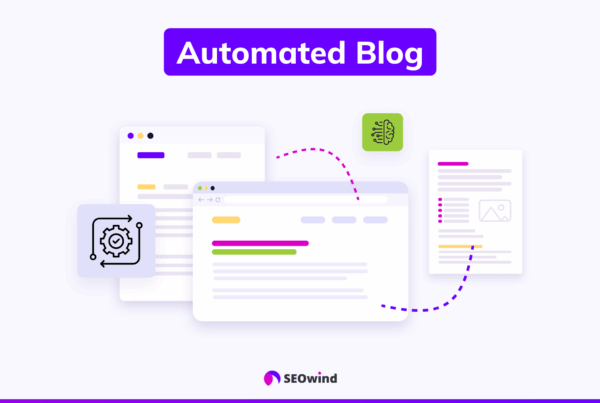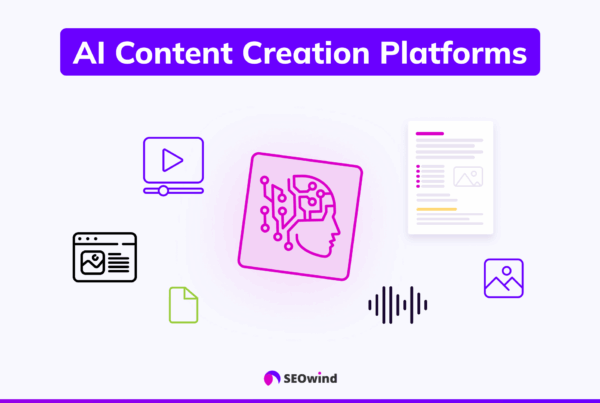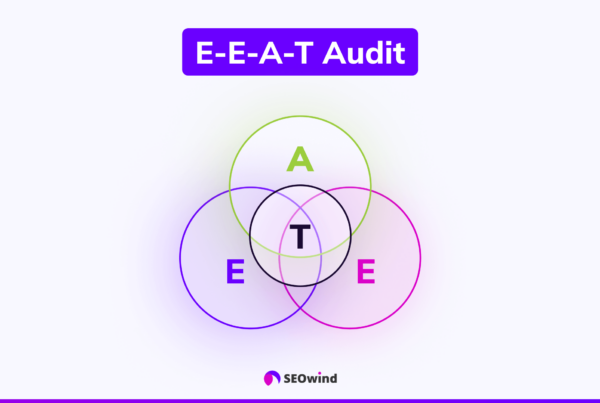The question isn’t whether AI will replace copywriters entirely, but how the relationship between artificial intelligence and human writers is changing. As AI writing capabilities advance rapidly, many professionals wonder about their future in the industry. This article examines the real impact of AI on copywriting, comparing human and machine capabilities, and revealing what skills will remain uniquely human.
What Is AI Copywriting?
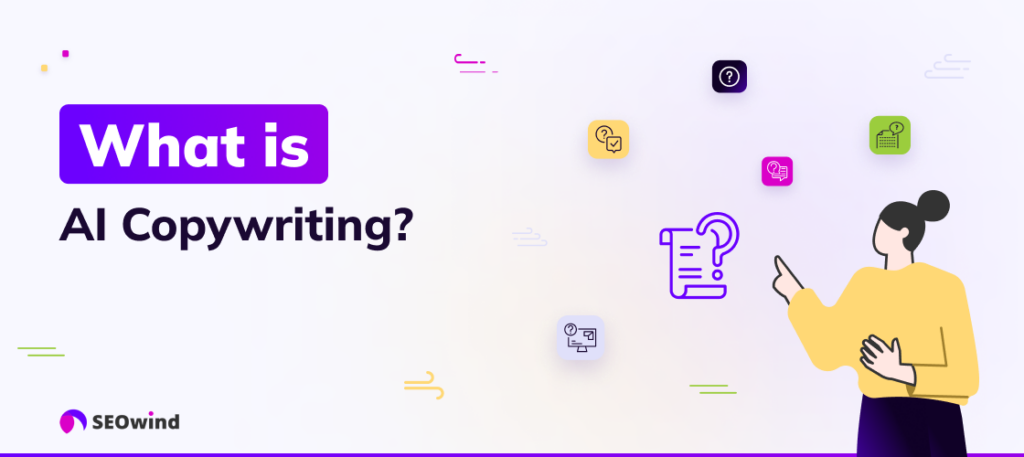
AI copywriting uses artificial intelligence programs to generate written content through sophisticated algorithms and machine learning techniques. These systems analyze human language patterns to produce text resembling human writing, from short social media posts to longer blog articles.
Modern AI writing tools take user inputs like keywords, topics, or creative briefs. Then, they generate content by drawing from their training on millions of existing texts. Using Natural Language Processing (NLP), these systems can create grammatically correct and stylistically coherent content that often passes for human-written at first glance.
The Rise of AI in Content Generation
The adoption of AI in copywriting has exploded in recent years. It is reflected in various research:
- HubSpot’s 2024 AI Trends for Marketers, AI adoption in marketing jumped from just 21% in 2022 to 74% in 2023, showing a rapid shift in content production methods.
- Recent research by Siege Media, 83.2% of content marketers plan to use AI content generation tools to assist their content marketing efforts in 2024. Furthermore, the research shows that 47% of marketers already use AI tools to generate content, while 28% use them to generate design elements.
- Moreover, 94.5% of content creators worldwide now use AI tools for editing, image generation, and writing captions.
AI vs. Human Writing: A Side-by-Side Comparison

To really understand what AI can and can’t do in copywriting, let’s look at how AI and human-written content stack up:
Creative Expression and Originality
| AI-Generated | Human-Written | Comment |
|---|---|---|
| Our software solution offers robust functionality that optimizes business processes, increases efficiency, and delivers measurable results for enterprises seeking digital transformation in today’s competitive marketplace. | Our software doesn’t just solve problems—it eliminates the Sunday-night dread of facing another week of spreadsheet purgatory. We’ve rescued thousands of hours that smart people like you can now spend on work that matters. | The AI version is grammatically perfect but uses generic business language. The human version creates an emotional connection through relatable experiences and conversational language that resonates with the target audience. |
Research and Fact Integration
| AI-Generated | Human-Written | Comment |
|---|---|---|
| Studies show that regular exercise is beneficial for health. It can help with weight management and improve cardiovascular function. Many experts recommend at least 30 minutes of physical activity daily. | According to the American Heart Association’s guidelines, just 150 minutes of moderate exercise weekly can lower the risk of death from cardiovascular disease by 22%–25%. What’s even more impressive? Doubling that can cut the risk by up to 38%, and it still won’t harm your heart. | The human writer provides specific sources, exact statistics, and expert commentary that establishes credibility. The AI offers generalized statements without precise attribution or up-to-date information. |
Brand Voice Consistency
There’s a common belief that humans have the upper hand in writing content that delivers the right intent, tone, and voice, and that AI often lacks the nuance to create engaging content and maintain consistent quality. However, using AI correctly lets you get content written in your distinct brand voice and tone.
Real-World Applications: AI Copywriting Success Stories

Looking at concrete examples helps illustrate how AI is being integrated into professional copywriting workflows with measurable results:
JP Morgan Chase: Doubling Engagement with AI-Assisted Copy
JP Morgan Chase partnered with Persado, an AI-powered language generation platform, to enhance their marketing copywriting. The implementation involved using the AI platform to generate and test copy alternatives for digital ads and email campaigns, with human marketers providing strategic direction and goals.
The team faced several challenges, including ensuring AI-generated copy remained compliant with financial regulations and convincing internal stakeholders of AI’s creative capabilities. However, the results were impressive:
- The pilot tests showed that AI-generated content could deliver a 450% increase in click-through rates (CTR) compared to human-written copy, which typically produced a 50–200% lift.
- A human-written ad with the headline “Access cash from the equity in your home” generated 25 applications per week, while Persado’s AI version-“It’s true- You can unlock cash from the equity in your home” – generated 47 weekly applications.
Coca-Cola: Accelerating Global Content Creation
Coca-Cola implemented a custom AI platform based on GPT architecture to rapidly produce slogans, social media posts, and campaign headlines. Their approach centered on collaboration: copywriters worked with the AI to brainstorm concepts and draft initial versions, which were then refined by human editors.
The company overcame significant hurdles, including training the AI to understand Coca-Cola’s nuanced global brand voice and managing creative teams’ apprehension about job displacement. The payoff was substantial: concept-to-campaign time reduced by 40%, enabling localized campaigns in multiple markets within days instead of weeks. Engagement metrics rose by approximately 25% on AI-assisted campaigns compared to the previous year.
Netflix: Personalizing Communications at Scale
Netflix integrated a proprietary AI copywriting assistant to personalize promotional emails based on viewing history, preferences, and regional trends. Their human marketers set parameters and reviewed AI-generated content before distribution.
Challenges included maintaining Netflix’s conversational brand tone and ensuring compliance with data usage regulations. The results were compelling: a 30% boost in email open rates and a 21% increase in click-through rates for AI-personalized campaigns compared to generic emails.
What’s notable across these cases isn’t that AI replaced copywriters, but how it amplified their capabilities. Success depended on strong human-AI collaboration and robust quality controls that preserved creative intent and brand authenticity.
Advantages of AI Writing Tools
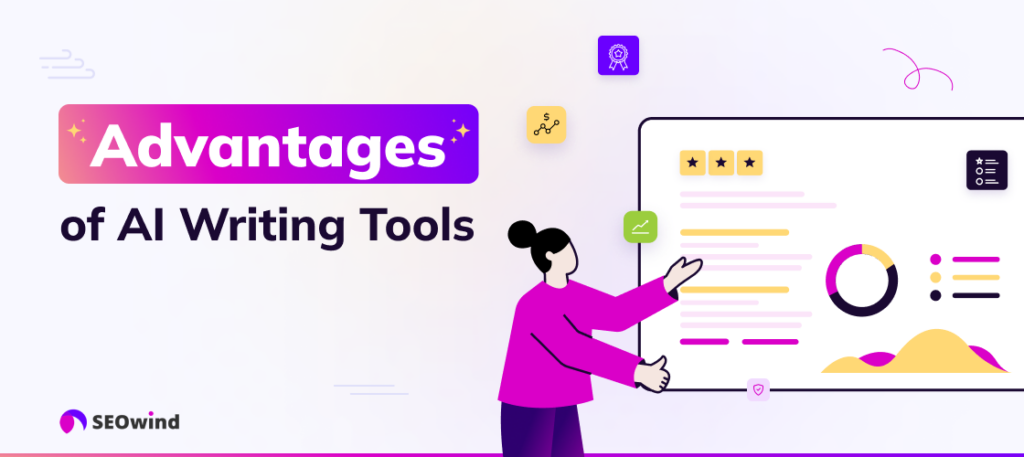
Despite their limitations, AI writing tools significantly benefit the copywriting workflow. Rather than replacing human writers, these tools are best viewed as powerful collaborators that enhance productivity.
Accelerated Ideation and Research
One of AI’s greatest strengths is its ability to quickly generate and organize ideas. When facing a blank page, writers can use AI to produce dozens of potential angles, headlines, or content structures within seconds. This capability transforms the brainstorming process from a potential bottleneck into a springboard for creativity.
For example, when creating content around a complex topic like “sustainable investing,” an AI can instantly compile the key concepts, regulatory considerations, market trends, and consumer attitudes that should be addressed. This provides a comprehensive starting point that might otherwise require hours of preliminary research.
Conduct Research
Content creation is about more than just composing pretty words. It involves rigorous research, which our beloved AI tools are good at. They can mine data from varied sources, conduct sentiment analysis, and hunt down relevant facts, streamlining what could otherwise be tedious.
Think of it like having your own personal Sherlock Holmes to scour the internet for supporting data or opposing viewpoints related to your topic. Such round-the-clock fact-finding missions can provide valuable context that bolsters your assertions while freeing up time for more creative pursuits.
Efficient First-Draft Generation
AI tools excel at producing structured first drafts based on outlines or briefs. While these drafts typically require significant editing, they provide a valuable foundation that eliminates the intimidation of starting from zero.
The productivity benefits are substantial. According to SurveyMonkey research, 93% of marketers using AI cite faster content generation as their primary reason for adoption. This acceleration allows human writers to shift their focus to strategic thinking and creative refinement.
Enhanced Data Analysis
Modern AI writing tools don’t just generate text; they can analyze vast amounts of data to inform content strategy. Advanced systems can identify trending topics, evaluate competitor content performance, and extract insights from thousands of customer reviews or comments at scale—tasks that would be prohibitively time-consuming for human writers.
However, despite these impressive capabilities, AI still lacks the emotional intelligence that makes human copywriting resonate deeply with audiences. As Eddie Shleyner, founder of VeryGoodCopy, emphasizes: “AI cannot connect the dots like we can. It can’t be personal like us, humans. It can’t feel the gravity of a profound moment, like a birth, much less the essence of another person.”
Disadvantages of AI Writing Software
While AI writing tools offer impressive capabilities, they have significant limitations that prevent them from entirely replacing human copywriters:
Factual Reliability Issues
One of the most concerning limitations of current AI writing tools is their tendency to generate “hallucinations”, confidently stated but entirely fabricated information. These systems often invent statistics, research studies, product features, or historical events without indicating false information.
When Bynder conducted a 2024 study comparing AI-generated versus human-written content, 56% of participants said they preferred the AI version over the human-made article. However, 52% of consumers reported disengaging from content they suspected was AI-generated, with 20% viewing brands using such content as untrustworthy.
Human oversight remains essential for fact-checking, as AI systems lack the critical reasoning skills to evaluate source credibility or cross-reference information. Publishing AI-generated content can damage brand reputation and reader trust without careful editing.
Note: It’s worth looking at the task the AI and trained copywriter had. Both had the same brief: “Write 300 words on how to clean your car”. I would argue that ChatGPT would get even better scores if the task were described better than humans.
Limited Emotional Intelligence
AI writing tools process language patterns but don’t truly understand human emotions or experiences. This fundamental limitation becomes particularly evident when writing persuasive copy that needs to connect with readers on an emotional level.
According to the Bynder study mentioned above, 26% of participants felt that brands using AI for website copy seemed impersonal, while 20% perceived such brands as lazy. For social media content suspected to be AI-generated, 25% viewed the brand as impersonal and 20% considered it untrustworthy.
Contextual Understanding Gaps
Current AI systems struggle with subtle contextual understanding, especially regarding cultural nuances, humor, idiomatic expressions, and audience-specific sensitivities. What might be appropriate for one audience could be ineffective or even offensive for another. AI often lacks the discernment to make these distinctions without human guidance.
Ethical Considerations in AI Copywriting
The rapid adoption of AI in copywriting raises important ethical questions that both brands and content creators must address:
Transparency and Disclosure
As AI-generated content becomes more prevalent, many industry experts advocate for transparency about how content is created. The question becomes: Should brands disclose when content is partially or entirely AI-generated? While regulations are evolving, establishing trust with audiences increasingly means being forthright about content creation methods.
Current practices vary widely. Some organizations openly acknowledge AI assistance, while others make no mention of it. However, with 71% of creators reporting positive audience reactions to AI-assisted content, the stigma around AI usage may decrease as quality improves.
Copyright and Originality Concerns
AI systems are trained on existing content, raising questions about intellectual property and originality. Copywriters must consider:
- The potential for unintentional plagiarism when AI repurposes training material
- How to ensure outputs are sufficiently transformed from source materials.
- The evolving legal landscape around AI-generated content ownership
While AI can help scale content production, responsible usage requires understanding these boundaries and implementing appropriate safeguards.
Maintaining Brand Authenticity
Most critically, brands must consider whether extensive AI usage aligns with their values and positioning. For brands built on personal connection and authenticity, heavy reliance on AI-generated content could undermine their core identity.
The key is finding an appropriate balance where AI enhances rather than dilutes brand authenticity, supporting human creativity rather than replacing the human elements that make brands distinctive.
The #1 Reason Why AI Won’t Replace Good Copywriters
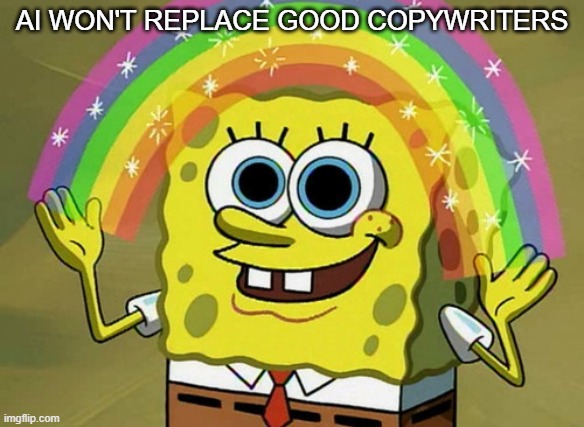
Despite remarkable technological advances, AI won’t replace skilled copywriters for one fundamental reason: human intuition. This intuitive understanding combines emotional intelligence, lived experience, and contextual awareness in ways machines cannot replicate.
Human intuition manifests in copywriting through:
Authentic Emotional Connection
Great copywriters don’t just understand emotions theoretically. They feel them. They draw on personal experiences to create authentic connections with readers. When describing the anxiety of a job interview, the joy of a child’s first steps, or the frustration of a persistent problem, human writers can tap into shared emotional experiences that resonate on a gut level.
The prevailing view among industry experts isn’t that AI will replace copywriters but will empower them. As Tom Winter notes, “It’s not ‘AI vs. humans’. It’s ‘AI-empowered humans vs. everyone else.'” Copywriters who learn to integrate AI into their workflows will outperform those who don’t.
Strategic Positioning and Brand Intuition
Eddie Shleyner points out that human copywriters will remain essential because “AI cannot write like us. It can’t tell stories like us. It can’t. Because the specifics, the details, the granularities we collect through our lived experiences belong to us.” This strategic thinking, knowing which angle will resonate most with a specific audience, is something AI can’t replicate without human guidance.
Effective copywriters intuitively understand how messages align with brand values and audience expectations. They can sense when messaging feels “off-brand,” even if technically correct, a subtle judgment that requires human perception.
Creative Leaps and Unexpected Connections
Human creativity often involves making unexpected connections between seemingly unrelated concepts. The famous “Think Different” Apple campaign or Nike’s “Just Do It” slogan demonstrate how human creativity can distill complex brand identities into simple, powerful statements through intuitive leaps that AI cannot make.
Tom Winter claims, “AI should be seen as a co-pilot, not the pilot. It’s a tool that is fast, scalable, and capable of handling heavy lifting. Still, it lacks depth, context, and creativity if misused. Its real value lies in how it’s used.”
AI Will Replace Writers… But Only the Unskilled Ones
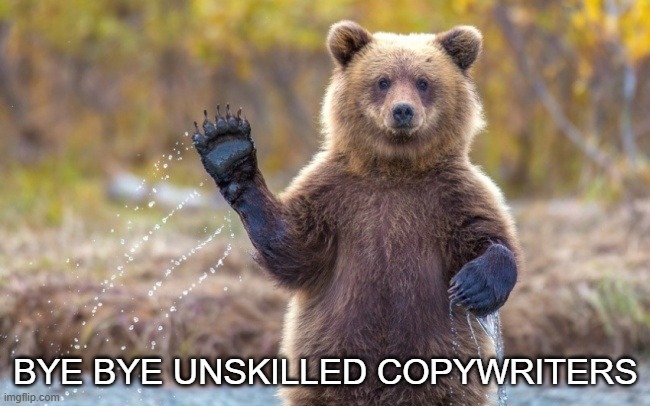
While skilled copywriters will continue to thrive, the emergence of AI writing tools poses a genuine threat to less experienced writers who haven’t developed specialized expertise or unique perspectives.
The Vulnerable Writers
Writers are most at risk of AI displacement, typically:
- Focus primarily on basic informational content without adding unique insights or analysis
- Rely heavily on templates and formulas without adapting to specific audience needs
- Lack of specialized knowledge in their writing niches
- Have not developed a distinctive voice or storytelling approach
The JP Morgan Chase case study illustrates this reality. After implementing Persado’s AI-powered copywriting tool, the bank effectively replaced the need for basic ad copy generation while requiring strategic oversight from skilled marketers.
Skills That Remain AI-Resistant
On the other hand, writers who possess the following qualities will likely find their skills increasingly valuable:
- Strategic thinking and campaign planning capabilities
- Deep subject matter expertise in specialized fields
- Ability to craft distinctive brand voices and maintain a consistent tone
- Skill in storytelling that creates emotional resonance
- Understanding of complex customer journeys and purchasing psychology
Our internal expert emphasizes that “the role of copywriters and content marketers will evolve. Within the next two years, AI may be able to perform nearly every tactical content task. But strategy, brand integration, nuanced editing, and expert insight will still require a human.”
Strategic Skills Development
“Even in an AI-driven workflow, human roles remain essential. Humans must define the content’s intent and objectives, craft detailed briefs, perform relevant research, and feed data to the AI.” Tom Winter explains.
The most valuable copywriting skills in the AI era include:
- Strategic Content Planning: Developing comprehensive content strategies aligned with business objectives and customer journeys.
- Brand Voice Development: Creating and maintaining distinctive brand personalities that connect emotionally with target audiences.
- Storytelling Mastery: Crafting narratives that engage readers emotionally while conveying key messages.
- Human Psychology Understanding: Applying insights about cognitive biases, emotional triggers, and decision-making processes to create persuasive copy.
- AI Tool Expertise: Becoming proficient in prompting, guiding, and editing AI-generated content to maximize effectiveness.
How to Effectively Use AI Writing Tools
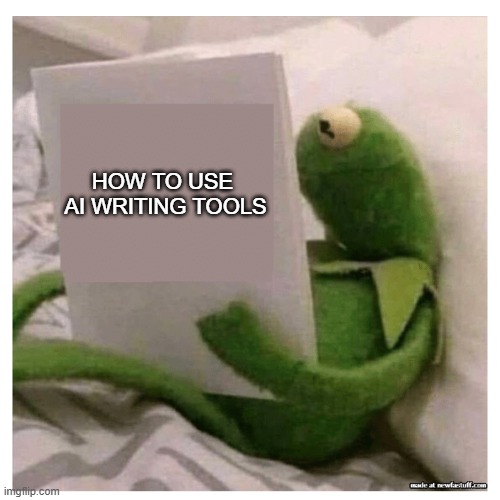
Rather than fearing AI, skilled copywriters embrace these tools to enhance their capabilities while maintaining the human elements that make their work exceptional. The key is developing a collaborative workflow that leverages the strengths of both AI and human creativity.
The CyborgMethod™: A Human-AI Collaboration Framework
Our internal subject matter expert recommends the CyborgMethod™, which “combines AI’s speed and scalability with human judgment, insight, and brand knowledge.” This approach creates a collaborative workflow where:
- Humans define strategic objectives, creative direction, and brand voice guidelines
- AI assists with research, outlining, and first draft generation
- Humans refine, edit, and inject emotional resonance and brand personality
- AI helps with optimization, alternative versions, and performance analysis
This collaborative approach enabled Coca-Cola to maintain its distinctive brand voice while accelerating campaign deployment across global markets.
Effective AI Prompting Techniques
Getting quality output from AI writing tools requires skill in “prompt engineering”—the art of providing clear instructions that guide the AI toward beneficial results:
Weak prompt: “Write about sustainability.”
Effective prompt: “Write a persuasive introduction for an eco-friendly household products brand speaking to environmentally-conscious parents. Focus on the emotional benefits of creating a healthier home environment for children while reducing plastic waste. Use a warm, encouraging tone that acknowledges the challenges of sustainable living without being preachy.”
The detailed prompt provides context, audience information, key selling points, emotional triggers, and tone guidance that helps the AI generate more helpful content.
Avoiding Common AI Content Pitfalls
As Tom Winter notes, “Many people get burned by AI because they treat it like a one-click solution. They rely on vague prompts, skip the research phase, and neglect editing. That’s not an AI failure, it’s a process failure.”
To avoid these issues:
- Always fact-check AI-generated claims and statistics.
- Edit for consistent voice and tone throughout the piece.
- Replace generic statements with specific examples and personal insights.
- Add authentic experiences and perspectives that AI cannot provide.
- Ensure the content reflects your brand’s unique position and values.
Evaluating Major AI Copywriting Tools
With the proliferation of AI writing tools, copywriters need to understand the strengths and limitations of different platforms to select those that best complement their workflow:
| AI Tool | Strengths | Limitations | Best for |
|---|---|---|---|
| SEOwind | – Deep research, – Automated briefs, – SEO optimization, – Built-in agents designed to research, assess, and refine, – E-E-A-T compliance | – Limited free plan – Mainly for articles and blog posts | – Content teams, – SEOs, – Agencies, – Freelancers focused on SEO-driven growth |
| Jasper | Highly adaptable for different content types; extensive template library; strong long-form capabilities; built-in SEO features | Higher price point; steeper learning curve; can generate generic content without skilled prompting | Marketing teams producing high volumes of diverse content types who are willing to invest time in mastering the platform |
| Copy.ai | User-friendly interface; excellent for short-form content like social media and ads; good collaborative features | Less robust for long-form content; fewer advanced customization options | Small businesses and freelancers who need quick copy solutions across multiple platforms |
| Writesonic | Strong focus on conversion-oriented copy; good e-commerce capabilities; competitive pricing | Output quality can be inconsistent; requires more editing for brand voice alignment | E-commerce businesses and performance marketers focused on conversion metrics |
| Claude (Anthropic) | Exceptional reasoning capabilities; more nuanced understanding of context; reduces hallucinations | Fewer dedicated copywriting templates; requires more precise prompting | Complex writing tasks requiring sophisticated reasoning and nuanced brand voice |
| ChatGPT (OpenAI) | Versatility; good understanding of instructions; continuous improvements | Generic outputs without detailed prompting; inconsistent brand voice maintenance | Ideation, outlining, and first drafts that will receive substantial human editing |
The key takeaway is that no single tool excels across all dimensions. Most professional copywriters use various tools for different purposes, selecting the right AI assistant for each specific task while maintaining human oversight.
How SEOwind Supports Copywriters
As AI reshapes the content writing industry, tools like SEOwind are becoming essential allies, not just for generating content faster, but for improving the quality, strategy, and performance of every piece produced.
SEOwind is designed to support copywriters at every stage of the content lifecycle: from building research-backed briefs, generating first drafts, and updating and optimizing existing content. It leverages a set of dedicated AI agents, each specialized for different tasks, to streamline and elevate the entire workflow.

Brief Creation with Real-Time SERP Intelligence
The process begins with SEOwind’s AI Research Agent. It analyzes top-ranking pages, identifies keyword clusters, extracts key entities, and compiles a content outline optimized for relevance and E-E-A-T. Copywriters get structured briefs that include suggested headings, questions to answer, relevant internal and external links, and a clear direction—all based on real-time data.
This eliminates the hours typically spent on competitive research and SERP dissection, giving writers a strategic starting point grounded in what’s currently working in the search landscape.
Writing Long-Form Content in Your Brand Voice
Once the brief is ready, copywriters can generate a complete first draft directly within SEOwind. Unlike generic AI writing tools, SEOwind incorporates brand voice settings, tone preferences, and audience definitions to ensure that content aligns with specific communication goals.
Writers are not replaced—they’re empowered. The AI provides a strong draft that serves as a base, which the writer can refine, personalize, and optimize.
Updating Existing Content with AI Evaluation
Refreshing outdated content is often among the highest-ROI activities in content marketing. Yet, it’s typically underutilized due to time constraints. SEOwind’s AI Eval & Refine Agent solves this by scanning existing articles for weak areas, such as missing keywords, outdated references, thin sections, or structural inconsistencies, and offering concrete suggestions for improvement.
Writers can then update content efficiently, preserving the original voice and narrative while ensuring it remains competitive and valuable to readers.
Specialized AI Agents Built for Copywriters
SEOwind’s strength lies in its modular AI architecture. Rather than using one general-purpose AI model, it deploys dedicated agents for specific use cases:
- AI Research Agent: Creates SEO-focused content briefs with keyword clustering, competitor analysis, and structural suggestions.
- AI Writer: Generates long-form content based on the brief and project-specific tone of voice.
- AI Eval & Refine Agent: Analyzes existing content, identifies optimization opportunities, and assists with rewriting sections.
This agent-based approach ensures better outputs and gives copywriters targeted support instead of bloated, one-size-fits-all content.
Features That Enhance Workflow and Quality
SEOwind includes several features designed to integrate seamlessly into a copywriter’s workflow:
- 1-click brief generation from target keywords
- Deep SERP and competitor analysis
- Brand voice and tone customization
- AI-assisted content evaluation and editing
- E-E-A-T-aligned structure and recommendations
- Support for both new content creation and content updates
- Project-level settings for consistent outputs across teams or clients
A Tool That Supports, Not Replaces
SEOwind doesn’t try to replace human copywriters. It supports them. It handles content creation’s research, structure, and mechanical aspects, allowing writers to focus on what they do best: strategic thinking, creative storytelling, and building emotional resonance.
In an era where content velocity matters but quality still wins, tools like SEOwind are not optional. They’re essential for staying competitive without compromising depth or originality.

The Future of Copywriting: Partnership, Not Replacement
The future of copywriting isn’t a competition between humans and machines but a partnership that combines the best of both. The prevailing perspective among industry experts is that AI-assisted human copywriters will outperform both AI-only and human-only approaches.
The Emerging Copywriter’s Toolkit
Tomorrow’s leading copywriters will leverage an expanding toolkit that includes:
- AI research assistants that compile industry insights, competitor analysis, and audience trends
- Collaborative drafting tools that generate content variations based on strategic briefs
- Advanced analytics that provide real-time feedback on content performance
- Specialized AI models are trained on company-specific voice and brand guidelines.
Our internal expert notes that “AI excels at speed: ideation, research synthesis, first drafts, and even self-critiquing. It accelerates processes but doesn’t make the hard decisions. That’s still up to us.”
The Future Value Proposition for Copywriters
Rather than being replaced, copywriters who adapt will find their roles elevated from content producers to strategic communication architects. Their value will increasingly come from:
- Setting creative direction and strategic messaging priorities
- Crafting compelling brand narratives and positioning
- Providing the human oversight that ensures accuracy, relevance, and emotional resonance
- Developing sophisticated AI prompting strategies for specific communication needs
In the United States, the adoption rate of AI for content marketing has reached 78% as of 2025, with marketing being one of the primary use cases. Copywriters who position themselves as AI-fluent strategic partners rather than mere content creators will thrive in this evolving landscape.
How Will AI Continue to Shape Copywriting?
The relationship between AI and copywriting will continue to evolve, with several trends emerging:
Hyper-Personalization at Scale
AI is enabling personalized messaging at an unprecedented scale. Rather than creating a single generic message, copywriters can use AI to generate variations tailored to different audience segments while maintaining strategic alignment and brand voice.
Netflix’s case study demonstrates this capability—their AI-powered system enabled personalized email campaigns that drove a 30% increase in open rates by tailoring content to individual viewing preferences.
Continuous Optimization Through Testing
AI systems excel at generating multiple variants for testing and analyzing performance data to identify winning approaches. This capability allows copywriters to focus less on guessing what will work and more on interpreting results to refine strategic direction.
Expanded Creative Exploration
By generating multiple content directions quickly, AI enables copywriters to explore creative approaches they might not have considered independently. This expanded ideation can lead to breakthrough messaging that might have been overlooked.
More Strategic Human Focus
As AI handles more routine content generation, human copywriters will focus increasingly on high-value strategic activities: understanding customer psychology, developing creative campaign concepts, crafting brand voice guidelines, and providing the critical human judgment that AI lacks.
Tom Winter concludes, “So no, AI won’t replace copywriters. But copywriters who ignore AI? They might get replaced by the ones who learn to use it better.”
The future belongs not to those who resist technological change but to those who harness it while developing the unique human skills that AI cannot replicate. In this evolving landscape, the most successful copywriters will be those who become skilled AI operators while continuing to provide the strategic thinking, emotional intelligence, and creative spark that genuinely connects with audiences.
